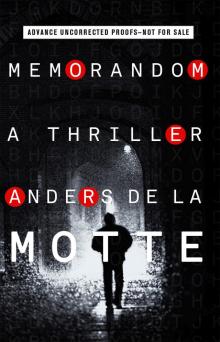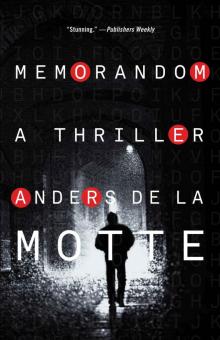- Home
- Anders de la Motte
MemoRandom Page 14
MemoRandom Read online
Page 14
Stenberg sat up straight.
“As you know, I’m also general secretary of the Bar Association, and generally regarded as your mentor,” John Thorning said. “Someone who’s part of Team Stenberg. Imagine the reaction if it leaked to the media.”
He paused.
“That my faith in the police, the organization for which you are ultimately responsible, is so low that I choose to initiate a private investigation into my daughter’s death.” John Thorning smiled at Stenberg, a cold smile that was little more than a twitch at the corners of his mouth. Then he sat down and folded his arms.
Stenberg did his best to look unconcerned, as if the threat didn’t really bother him. But the old bastard was right. It would harm his reputation if one of his most ardent supporters was seen to be dissatisfied. It would give rise to unnecessary speculation, maybe even lead others to reevaluate their support. And the Bar Association was a very influential body, capable of shaping opinion. He would need its support in the future. But political considerations were really secondary. It was considerably more troubling that an external investigator might end up snooping about in the case. All it would take was one witness whom the previous investigation had missed. Someone who had spotted Stenberg down in the garage or out in the street, or had seen his registration number or something else that could link him to the scene.
In some ways the old man had done him a favor by coming to see him first. It gave him an opportunity to take control of the situation. Stenberg closed his eyes and discovered that his heart was beating a bit faster. The way he had felt in the garage came flooding back. The sense of sharpness. Of being completely in the moment.
“I hear what you’re saying, John,” he said slowly. “Naturally, I want to help you. But a Swedish government minister isn’t permitted to intervene directly in operational matters. I’d risk being called in by the Standing Committee on the Constitution. Anything of that sort wouldn’t do either of us any favors.”
John Thorning’s expression hadn’t changed.
“What I might be able to do is ask one of my more trustworthy colleagues to take a judicious look at the case. Go through the investigation again and follow up any loose ends, and hopefully that could give you the answers you think you’re missing,” Stenberg went on.
He left his mouth open for a moment, waiting until the old toad leaned forward.
“But in that case I would have to impose certain conditions, John.”
Stenberg leaned across the desk as well, his face barely a foot and a half from his former mentor’s. John Thorning nodded almost imperceptibly. He thought he’d got his way, the way he usually did. That he was still the one pulling the strings. He hadn’t realized that things had changed.
“Firstly.” Stenberg held up his thumb. “You have to leave everything to us. No private detectives running around complicating matters, not now, and not later. Is that clear?”
Thorning went on nodding, slightly harder now.
“Secondly.” Stenberg held up his index finger as well. “No leaks. If I see the slightest hint in the media that some sort of secret investigation is under way . . .” He paused long enough to be interrupted.
“Of course not, Jesper, this stays between us.”
Bait taken, hook in mouth. Now to make sure the barbs were secure.
“Excellent. There’s just one more condition, John, and it’s nonnegotiable. I suggest that you think it through very carefully before replying.”
“I’m listening, Jesper.”
Stenberg stood up from his chair, walked around the desk, and sat down on one corner of it. He suddenly realized that he was enjoying the tension of this game. His heart was thudding in his chest, and the sense of being in the moment was almost total.
“If my people reach the same conclusions as the previous investigation,” he said. “If all the evidence indicates that Sophie committed suicide, you have to accept that. Put the matter behind you and move on, no matter how painful it might be.”
John Thorning opened his mouth to say something, but Stenberg was quicker.
“To put it plainly, John: no private investigations, no long interviews in the Sunday edition of Dagens Nyheter, no teary appearances on daytime chat shows. Nothing of that sort. None whatsoever. I want you to give me your word on that!”
John Thorning’s lips narrowed to form a thin line. His eyes became slits. Stenberg was unconsciously holding his breath and felt he could almost taste the tension in the room.
“And if the reverse happens.” The old man cleared his throat. “If you do find something to suggest that Sophie . . .”
Stenberg swallowed a barely noticeable hint of nervousness, looked John Thorning in the eye, and held out his hand for a firm handshake.
“If anything crops up, any evidence to suggest that someone else was involved in Sophie’s death, I guarantee that we will identify that person and bring them to justice. You have my word on that, John.”
NINETEEN
Sarac took a couple of cautious steps across the snow-covered cul-de-sac. He looked up at the wooden building, shading his eyes with his hands so as not to be blinded by the sharp sunlight. He must have slept like a log; he hadn’t even noticed them getting onto the car ferry.
The air was crisp, the silence almost total. Just a few magpies calling from the tall pines around the old house. Nothing but snow and trees in all directions, with the exception of the little drive winding off toward the road more than six hundred feet. The house was one of the oldest on the island, a big, yellow archipelago villa, two stories, built in the early 1900s. There was a glazed veranda facing the garden, with leaded windows and plenty of ornate woodwork. The plot was huge, stretching all the way down to the water and the private jetty on the other side of the wooded hillock.
Molnar went up the steps to the porch, kicking away some of the snow before raising a loose plank. He fished out a key, unlocked the door, and went inside. Sarac slowly followed him. He was taking small steps to stop himself from slipping. Josef kept close behind him, ready to catch him if anything did go wrong.
Sarac stopped in the porch and inhaled the familiar smell of old wood and damp. A torrent of memories overwhelmed him. Images of idyllic summers with Elisabeth and her children. Cloudless skies, trips in the rowboat, hammocks in the shade, and Evert Taube on the transistor radio. He longed intensely for those moments. But could they really have been as perfect as he remembered them? As beautiful and faultless? It was impossible to say.
“Come in, David.” Molnar came back to the door. “After all, it is your house. Cold as hell, but I’ll get the wood burner going. It’ll soon warm up. You don’t happen to know if there’s any oil in the tank?”
“No idea,” Sarac muttered.
“No, of course not, sorry.” Molnar made a little apologetic gesture. “Can you sort some wood out, Josef?” he called over Sarac’s shoulder. “The woodshed’s around the back of the house.” Molnar closed the front door behind them.
“Is this okay with you, David?”
Sarac nodded mutely.
“I was just thinking that this is a perfect place to lie low for a while. It’s registered in your sister’s name, and she’s in Canada, so there’s no link to you on any database,” Molnar said. “Wallin and Dreyer’s people aren’t likely to find their way here for a while.”
Nor anyone else either, Sarac found himself thinking.
They went into the large hallway. The staircase to the first floor swept up one of the walls. They turned left and followed the scrubbed wooden floor into the spacious rural kitchen. It all looked exactly as Sarac remembered, from the blue wooden panels along the bottom half of the walls to the stripes of the rag rug. Maybe his happy memories of this place weren’t too inaccurate after all?
Molnar knelt down and started to fiddle with the big iron stove. He opened and closed the cast-iron doors at random, without really knowing what he was doing.
“There’s some wood in that white box at the
back, on the wall,” Sarac said. “Just press that button on the side.”
Molnar did as he was told and there was a rumble as a couple of blocks of wood fell into place. He tore up some newspaper and pushed it in through a hatch. He fiddled for a while with a long brass lighter, swearing out loud.
Sarac carried on through the kitchen into the next room, where the walls were all lined with built-in bookcases. Two worn velvet armchairs and a small table were the only pieces of furniture in the room. The room smelled of textiles, dust, and old books. Of Grandma. He resisted the temptation to sit down in her chair and turned right instead, into the big living room, which led to the veranda. The winter sun was shining in through the windows and he could see Josef’s powerful frame moving about over by the little outhouses that lined one side of the property.
The snow-covered lawn was about a hundred and fifty feet long and sloped gently down toward the forest. Halfway down stood the rusting base of a flagpole, and at the far end of the lawn he could make out a few old fruit trees that almost blurred into the woods. The whole place was astonishingly beautiful, and he stood there just looking at it for a long while.
“Right, the stove’s lit now.” Molnar rubbed his face, inadvertently smearing a small speck of soot across his cheek. “I’ll try the boiler in a bit. Shall we go back to the kitchen, or would you rather . . . ?” He gestured toward the large sofa that stood against one wall.
Sarac barely noticed him. He was having trouble taking his eyes from the view. There was something about the shadows at the edge of the forest that was absorbing his attention, but he couldn’t put his finger on what it was.
“David?”
“The sofa,” Sarac replied.
“Here you go.” Molnar put a cell phone on the coffee table between them. “It’s pay-as-you-go, the number’s on the back. I programmed my cell as quick-dial number one, Josef’s as two. Call if there’s anything you need, no matter what. We’ll make sure the fridge and freezer are full before we leave, same with the wood.”
He gestured toward the outhouses. “And if Wallin and Dreyer ask, obviously we dropped you off at your apartment and have no idea where you went after that.” Molnar smiled and winked at him, and Sarac did his best to return the smile.
“The most important thing right now is for you to take things easy and get some rest,” Molnar went on. “Have you got enough drugs?”
“Hmm,” Sarac muttered, not really listening. His eyes kept wandering back to the edge of the forest. The shadows down there seemed almost to have a life of their own. He suddenly remembered the room he had dreamed about. The photographs, the harsh expressions on the men’s faces, the spiderweb linking them together.
“I think he’s looking for me,” Sarac said vaguely.
“Who?” Molnar said. “There are quite a few to choose from.”
“Janus. I think he’s trying to get hold of me.” He heard the words come out of his mouth. Even so, it was like listening to a stranger.
“You’re going to have to be a bit more specific, David.” The new, sharper tone in Molnar’s voice made Sarac wake up.
“Er, of course.” He took a deep breath, trying to get his thoughts in order. “Well, someone tried to get into my apartment last night. Someone who had keys.”
“Did you see who it was?”
Sarac shook his head. “The security chain was on; all I saw was an arm through the gap in the door.”
“But you think it was Janus? And that he’s got keys to your apartment?”
“Mmm,” Sarac mumbled. He could hear how uncertain he sounded. “And someone had searched the apartment as well, it was a hell of a mess.”
“And what makes you think it’s Janus?” Molnar said. “Your address isn’t listed anywhere, we never tell our sources where we live. Never, ever, that’s one of the most basic security regulations. You’d never disregard that, would you?”
Sarac tried to think. He wondered about mentioning what had happened at the hospital. The tobacco man who had talked about an agreement, the man in the tight surgeon’s gown taking a shortcut to his ward. The well-used meth pipe he’d found in his own apartment. Something about the look on Molnar’s face told him that wouldn’t be a good idea. Not until he himself was sure about what was going on. About what was real, and what was just nonsense cluttering up his damaged brain.
Paranoia is a fairly common side effect of a stroke. Who’d told him that, Dr. Vestman? No, it was his care assistant, what was her name again? Damn!
Sarac suddenly realized he felt ashamed. Ashamed of his confused chatter, his hopeless physical condition. And other things, things he couldn’t really remember.
“Peter, I really don’t know. Sorry, everything’s a bit of a mess right now.” He closed his eyes and pressed his fingertips to his eyelids as if to push back the headache. Molnar studied him carefully and seemed to be thinking about something.
“Okay, I understand. You’ve been through a terrible time lately, the sort of thing that would break most people. You really don’t have to apologize. I’ll get a couple of men watching your apartment from this evening. We’re extremely keen to get hold of Janus as soon as possible.”
Sarac nodded and tried to think of some way to change the subject of conversation. He had questions, loads of questions. He had pretty much two years’ worth of memories to try to reconstruct. But he didn’t know where to begin. All of a sudden everything felt so huge, so overwhelming.
“The car crash,” he finally said. “Bergh seemed to think it wasn’t an accident. That my crash was somehow connected to the missing backup list. Was that why there was a Securitas guard at the hospital?”
Molnar nodded. “Considering what’s at stake with the Janus affair, Bergh probably just wanted to err on the side of caution. But, like I said, we got there just after you crashed. There wasn’t anyone else in the tunnel.”
“What about my cell phone, then?” Sarac said. “What happened to that? It wasn’t in my locker at the hospital. You said I called you from the car just before it happened.”
Molnar shrugged.
“Missing. It was probably somewhere inside the car. The wreckage . . .” He paused and rephrased what he was about to say. “The car was totaled, there was hardly anything left of it. We were sure you . . . Well, things didn’t look good. Your phone was the last thing it would have occurred to us to look for.”
“The list of calls, did that come up with anything useful?” Once again Sarac was surprised at himself. The question was entirely logical, but he had no intention of asking it until it popped out of his mouth. Some parts of his brain seemed able to function perfectly well on their own.
The same thought seemed to have occurred to Molnar, because one corner of his mouth twitched.
“Yes, we got the list. The last call you made was to my cell, like I said. Before that you called a whole load of pay-as-you-go numbers that we haven’t managed to identify.”
“Can I see it? The list of calls, I mean. I might recognize some of the numbers.”
Molnar frowned. “Sure, but do you really think now’s the right time for that? Wouldn’t it be better for you to concentrate on getting better?”
The feeling came out of nowhere, without the slightest warning. Sarac couldn’t identify what had triggered it. The look on Molnar’s face hadn’t changed, and as far as he could tell his tone of voice was exactly the same. Even so, Sarac couldn’t shake the feeling, and it was growing stronger with each passing second. There was more information, something connected to the crash and his cell phone. Something Molnar didn’t want to reveal.
TWENTY
“Wallin, Jesper Stenberg here. Have you had a chance to look at what I was asking about?”
“Minister of Justice, good morning! Oh yes, the matter was investigated by the crime unit of the City Police, just as I thought. But I’ve asked a colleague to take a closer look at it, and to come up with a good reason that shouldn’t raise any suspicions. I’m expecting to get a
report between Christmas and New Year’s.”
“Good. We can rely on his discretion?”
“Hers . . .”
“Sorry?”
“Her discretion. It’s a woman, Detective Inspector Julia Gabrielsson. She’s currently training to be a senior officer and has just done a six-month exchange with the FBI. Young, ambitious, exactly the sort of colleague you tend to like. And reliable as well.”
• • •
Detective Inspector Julia Gabrielsson stood in the hall as she slipped the key ring back into her jacket pocket. Apart from the faint sound of traffic in the streets below, the apartment was completely silent. She had read the report of the preliminary investigation that morning. Nothing particularly odd. A woman with a documented history of mental problems and a bathroom cabinet stuffed full of antidepressants decides to open a window and jump out. Suicide note written on her iPad and sent by e-mail, all very 2013.
The postmortem identified a mass of injuries that were fundamentally all consistent with a fall from a considerable height. And no injuries that weren’t. The stomach contents were the usual farewell cocktail of strong spirits and tablets.
There had been nothing odd at the scene either. The door of the apartment was securely locked, no signs of a break-in, nor anything else to indicate that anyone else had been present. One of the neighbors had apparently heard agitated voices from the apartment, but because the man had, by his own admission, drunk at least a whole bottle of wine and four shots, his statement was hardly very solid. He had also seemed a bit too talkative, the sort of person who might well adjust his memory to be amenable to the police.
There was really only one conclusion: if Sophie’s dad hadn’t been one of the most well-known lawyers in Stockholm, the case would have been buried and forgotten and she could be getting on with considerably more important matters. But Oscar Wallin wanted to do John Thorning a favor and had called her in. Obviously she had said yes; Oscar was aiming high, right for the top, and she was thinking of tagging along.

 Rites of Spring
Rites of Spring Game: A Thriller
Game: A Thriller End of Summer
End of Summer Buzz: A Thriller
Buzz: A Thriller The Game Trilogy
The Game Trilogy Bubble: A Thriller
Bubble: A Thriller MemoRandom
MemoRandom Ultimatum
Ultimatum MemoRandom: A Thriller
MemoRandom: A Thriller